The best rock films can make us laugh, make us cry, or make us think. Sometimes, they can do all of those and, maybe more importantly, make us rock out along the way. Since rock music first appeared on the big screen way back in the 1950s, filmgoers have been able to rock out to many good and some great rock-and-roll movies. Given that it would be nearly impossible to reduce all the great rock films to a single Top 10 list without leaving off too many worthy candidates, here first is a list of ten fave rock films, all fiction, excluding documentaries, biopics, and performance films, all of which you’ll see listed here in subsequent articles at Film Obsessive over the next month or so. Rock on!
10. The Girl Can’t Help It
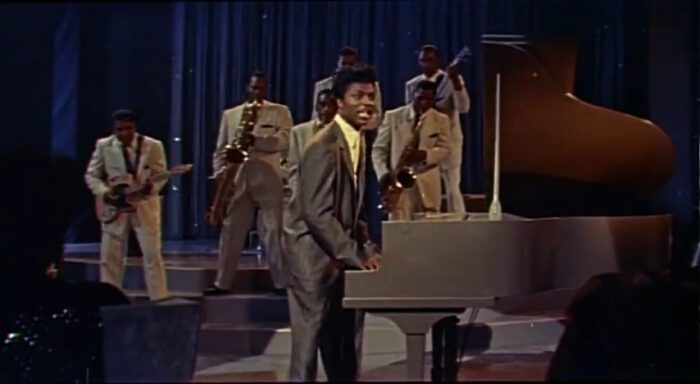
Director Frank Tashlin was a master of animation. Bombshell Jayne Mansfield was an unproven talent in her first major film role. De Luxe Color was the sparkly new technology designed to draw theatergoers away from their living-room television sets. And rock and roll was the drug that brought them all together in the delightfully absurdist The Girl Can’t Help It. A jukebox musical about a mobster’s girlfriend and a has-been agent hoping to revive his career, this Cinemascope feast was nothing short of an addictive drug for the eyes and ears. In the 1950s a number of films aimed to capitalize on the new craze of rock and roll, but The Girl Can’t Help It brought out a festival’s worth of trailblazing headliners in finger-popping performances to set the screen on fire: Fats Domino, Julie London, Eddie Cochran, the Platters, Gene Vincent, and an incandescent Little Richard flouting every known convention of comportment and gender conformity. From then on, rock and roll was ready to take on the cinema—and the world.
9. Rock and Roll High School
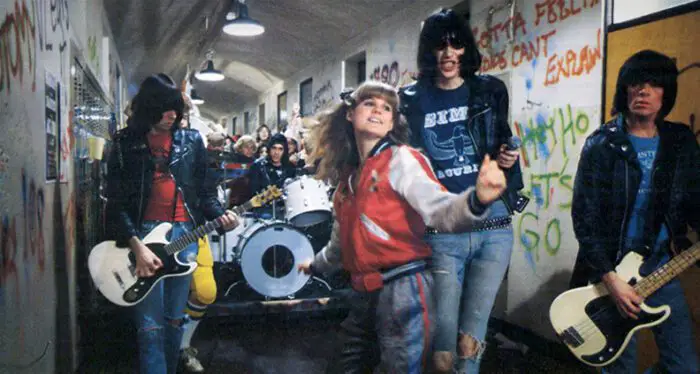
“I just wanna have some kicks / I just wanna get some chicks / Rock, rock, rock, rock, rock ‘n’ roll high school.” The Ramones were never known for their lyrics. “Gabba Gabba Hey,” inspired by Tod Browning’s Freaks, was their cri du cœur. But they expressed their era’s ethos perfectly. P. J. Soles is aspiring delinquent/songwriter Riff Randell, a Ramones fan whose filing-cabinet’s worth of disciplinary records won’t stop her from meeting her favorite band. After all, she’s written a song: “Rock and Roll High School.” This girl can’t help it, even when a despot principal takes a stand against her and against rock and roll: “Do your parents know you’re Ramones?” he demands of the rockers. Well, that sh*t won’t stand against a student body united in protest and a soundtrack full of the Ramones (with a little help from Nick Lowe, Todd Rundgren, Chuck Berry, and Brownsville Station). Turns out, Rock and Roll High School becomes just that, a gleeful overthrow of a dictatorship in the name of rock. Hail, hail rock and roll!
8. That Thing You Do!
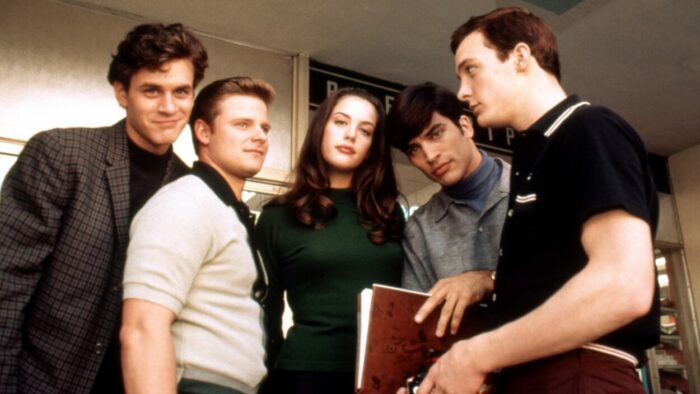
By the time he had earned enough cultural capital to write and direct his first film, Tom Hanks had aged out of a role that might have been perfect for him 15 years earlier. So he took a pre-Colonel Parker role as the up-and-coming band The Oneders’ manager. And no mater, for Tom Everett Scott makes a near-pitch-perfect stand-in for a typical Hanks role, supported by an excellent cast of bandmates in Johnathon Schaech, Steve Zahn, and Ethan Embry, with Charlize Theron and Liv Tyler along for the ride. Even better is the cracklin’ Beatlesque hit “That Thing You Do,” written by Fountains of Wayne’s Adam Schlesinger, an earworm so catchy it propels a good chunk of the narrative as the Oneders rocket towards a brief moment of fame before their jealousies and insecurities win out. That Thing You Do! might be slight, inconsequential even, but it’s so winningly performed and tightly scripted it’s not worth carping about. Like a good pop single, it sinks its hooks in quick and deep.
7. School of Rock
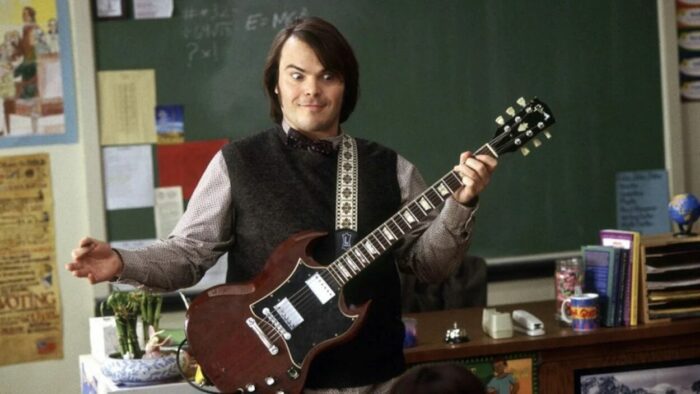
At his worst as a performer, Jack Black can be cloying and insufferable, and he’s made some questionable career choices (wouldn’t it be funny if we paired him with Gwyneth Paltrow in a fat suit, for instance, must have thought the execs behind Shallow Hal). But when his wildman idiosyncrasies are tempered just a bit and he’s given a role to character to play that does more than mug, the man can carry a film. And in School of Rock, he does just that, alongside a great supporting cast of students gearing up for the battle of the bands. There’s nothing experimental or innovative about School of Rock, nothing especially cinematic or historically important about the film; its greatest cultural impact is probably inspiring a franchise of like-minded, like-named programs for aspiring rockers of all ages. But what School of Rock is, is a massive hit (on a modest budget) that perfectly married Black’s comic excess with a multi-generational feel-good story for the ages, one nearly everyone could get behind, and in the end a winning effort from the inconsistent star, writer Mike White, and director Richard Linklater.
6. Sing Street
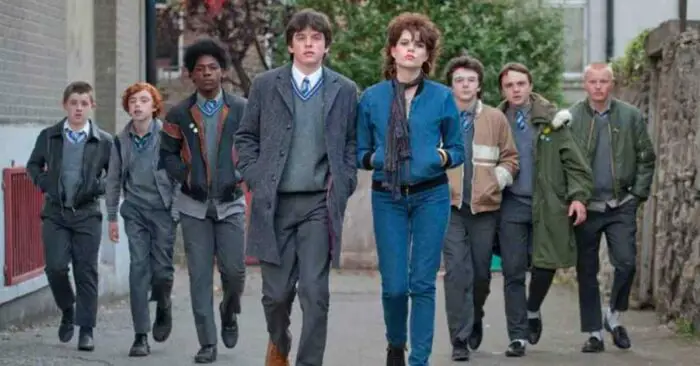
The delightful comedy Sing Street shares more than a little in common with my top film on the list, but more than a good number of rock-and-roll films are at their heart just versions of “let’s form a band” or “put on a show.” Set in 1980s Dublin, Sing Street’s conceit is straightforward: hoping to impress his new crush Raphina (Lucy Boynton), young Conor (Ferdia Walsh-Peelo) forms a band and sets his sights on stardom, despite the aggravations of a local bully and the impending breakup of his parents’ marriage. Featuring a kaleidoscope of some of the best ’80s Britpop and Postpunk, from The Cure and Duran Duran to The Clash and The Jam (not to mention a little Hall & Oates on the side), with excellent original music from Danny Wilson frontman Gary Clark, members of the band Relish, Adam Levine, and others, Sing Street crackles with energy and electricity. Shot in an intimate coming-of-age style with close-up and medium shots, here’s a rock and roll film that focuses first on finding one’s identity and solving the problems life throws at you. Both work better with music, something Sing Street never forgets.
5. Quadrophenia
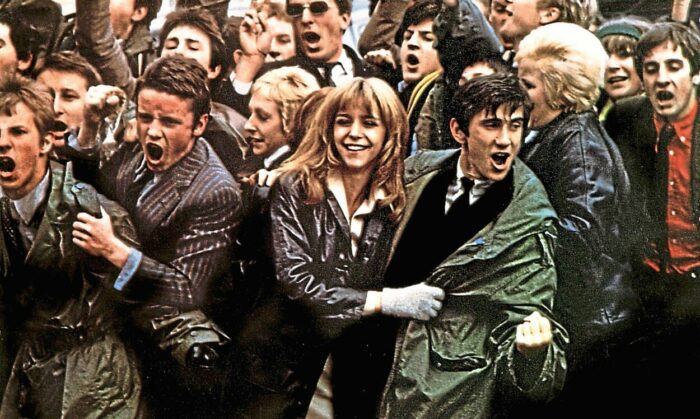
It was always the older, bigger, brasher brother that got all the attention, but to me The Who’s Tommy, adapted to the screen in 1973 by Ken Russell as an all-star affair, was simply a mess of a film, despite a few great songs. I always preferred the more tightly focused and cinematically grounded Quadrophenia from 1979, a film set in the very real London of 1964 and the class conflicts of the Mods and Rockers. Cast with lesser-known actors (including a young Sting as the Ace Face who’s just a Bell Boy) and shot in the mode of British kitchen-sink realism, the film’s study of male adolescent angst has held up perfectly well over the decades. Phil Daniels is excellent as Jimmy, disillusioned with his life and angry with his family, looking to drugs, girls, and Mods for insight and inspiration but finding little. The Who’s power was never more immense or intense than in “The Real Me” or “Love Reign O’er Me,” songs that made for a perfect complement to the still-excellent trauma of youth.
4. Almost Famous
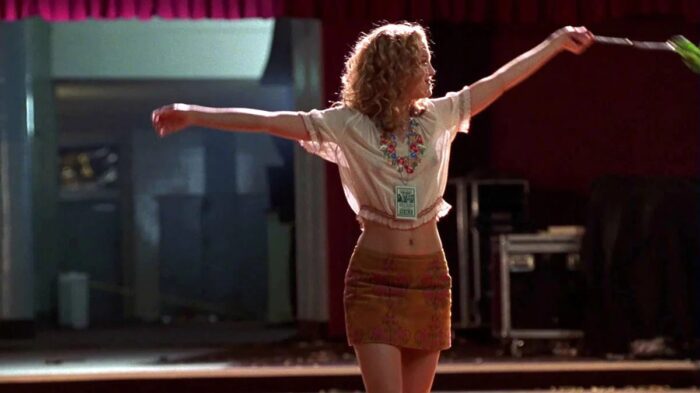
Cameron Crowe’s lovely, lilting ode to his youth as an aspiring rock journalist hit all the right notes in 2000, except at the box office where it failed even to make back its estimable $60 million budget. But critics took notice, offering up a bouquet of flattering reviews, and be the end of the year Almost Famous was making top-ten lists, earning Academy Award nominations, and inspiring scores of off-key group singalongs to Elton John’s “Tiny Dancer.” Sure, Kate Hudson’s Penny Lane may have been the Manic Pixie Dream Girl that started it all (though it’s a trope that goes back much further than the 21st century), but Almost Famous‘ sweet reverie and earnest soundtrack—courtesy of been-there-done-that rockstars Nancy Wilson, then Crowe’s wife, Peter Frampton, and others—made audiences swoon for a sweet time after. I’m not convinced Almost Famous earns a spot on the best films of all time, or even of the 21st century, where you might still find it, but it’s coming in close to the top of the charts here. Credit too to young Patrick Fugit for a stellar performance as the sharp young writer with “developing” social skills and to Philip Seymour Hoffman as the veteran critic Lester Bangs.
3. This Is Spinal Tap
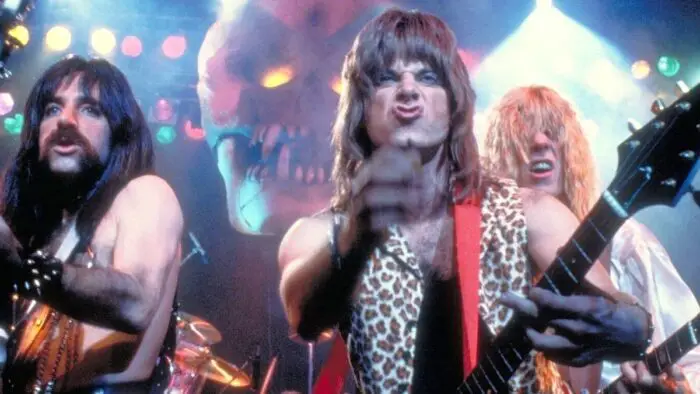
This Is Spinal Tap wasn’t the first rockumockumentary to skewer the recognizable tropes of the rock-doc genre—the 1978 Beatles satire All You Need Is Cash, featuring the faux four The Rutles, got there first—but Rob Reiner’s 1984 comedy set the Stonehenge stage for a robust new era of mockumentary filmmaking while serving up some of cinema’s most blissfully comedic moments. Finding the way to the stage, suffering dysfunctional props, ensconcing a foil-wrapped cucumber, turning up the amplifiers to 11—This Is Spinal Tap provided plenty of fodder for mirth. You didn’t need to be a metalhead to get the joke, but rock’s casual misogyny and unfettered ego-stroking well deserved the proper skewering Reiner and crew delivered. Plus, the band offered up some great songs. Who knew “bottom” rhymed with “got’em”? Christopher Guest took the cue and ran with it, making several great films in the same vein, each of them examining a subculture with the astute gaze of a social anthropologist and honing the mockumentary style to perfection. Stay tuned, some four decades later, for its long-awaited Last Waltz-style sequel!
2. A Hard Day’s Night
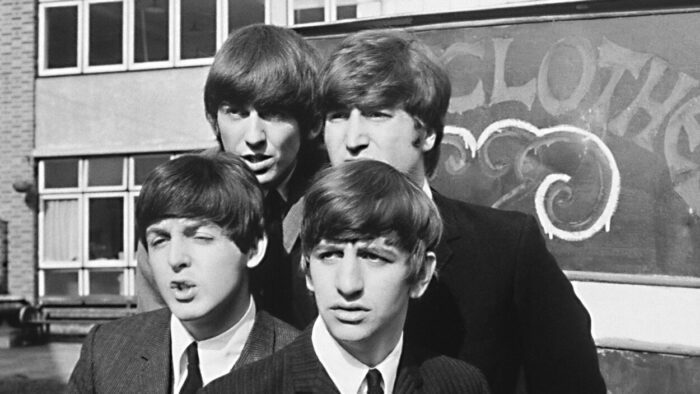
I’m slotting A Hard Day’s Night here in this group of fiction films even though The Beatles are playing themselves, really, in Richard Lester’s Nouvelle Vague-influenced film following the lads through the manic heights of Beatlemania. The film did a lot to codify the band members’ discrete personalities as the “Fab Four” era established them: John Lennon as the savvy, slightly cynical leader, Paul McCartney as the eager-to-please cutie-pie, George Harrison as the quietly trenchant stoic, and Ringo Starr as the affable sad-sack happily along for the ride. A jukebox musical dressed up as documentary with only the sparest of narratives threading the songs together, A Hard Day’s Night remains a near-euphoric experience some sixty years after its release, from the ringing sustained notes of its unmistakable first chord and giddy title sequence through its dry English humor to those impeccable, extraordinary songs: “Can’t Buy Me Love,” “If I Fell,” “And I Love Her,” “I Should Have Known Better,” “This Boy.” Somehow, The Beatles cracked the genius code, marrying their quick wit and good looks with a cinematic debut that was the equal of their cheeky irreverence and nearly universal appeal. Whatever you want to call it—fiction, nonfiction, documentary, performance film—A Hard Day’s Night is pure, perfect pleasure.
1. The Commitments
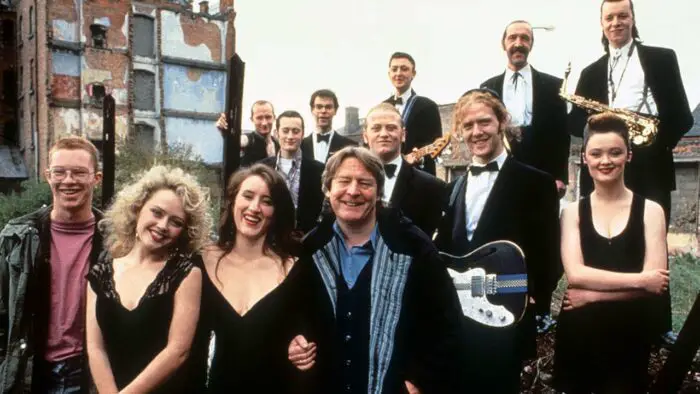
Maybe I am out on a limb here, but I simply can’t think of another fiction film that so adroitly marries the passions of rock music with the gusto of performance as The Commitments. Alan Parker’s to-the-vest adaptation of Roddy Doyle’s fine 1987 novel takes us to the streets of north Dublin, where young fanatic Jimmy Rabbitte (Robert Arkins) follows his muse to assemble a rock-and-soul band. At first his enthusiasm is enough to draw together an outsize lead singer, a rhythm and horn section, a trio of female backup singers, and a veteran trumpeter with plenty of stories to tell, some of which may even be true. But the band’s frictions and inexperience, combined with a savage bouncer and some less-than-legit business partnerships, put the franchise at risk. So does Joey’s hooking up, in turn, with each of the backup singers, not to mention his promise to get Wilson Pickett to join The Commitments on stage. It’s a wild, frothy stew of fisticuffs and f*ckups, but above all, The Commitments is a riotous ode to the superb music that gives these barely-adults hope and life.
Honorable Mention: Velvet Goldmine (1998), Todd Hayne’s dizzying, surreal glam-rock ode to the androgynous but absolutely not asexual ’70s. Hedwig and the Angry Inch (2001), John Cameron Mitchell’s adaptation of his stageplay, is an equally astute gender-bender with some first-rate performances.
Don’t Bother: Sergeant Pepper’s Lonely Hearts Club Band (1978) the movie that killed Peter Frampton’s career. Somehow, Aerosmith and Earth, Wind and Fire escaped unscathed with hit covers of “Come Together” and “Got to Get You Into My Life,” respectively, and even the Bee Gees didn’t fare too badly, but this jukebox-musical parade of late-Beatles cuts is less sadly less Beatlesque than anything ever associated with the band, a crass capitalist money-grab of a literally unwatchable film.
Stay Tuned: Up next at Film Obsessive is the Favorite Rock Films: Documentaries list. What’s on yours?




Thank you. I thoroughly enjoyed your list. One that I would have included is Singles. It’s definitely in my favourite fiction rock movies of all time.
Thanks for reading, Jeremy, Singles is a good candidate! It did a great job, I thought, with the Seattle grunge scene.